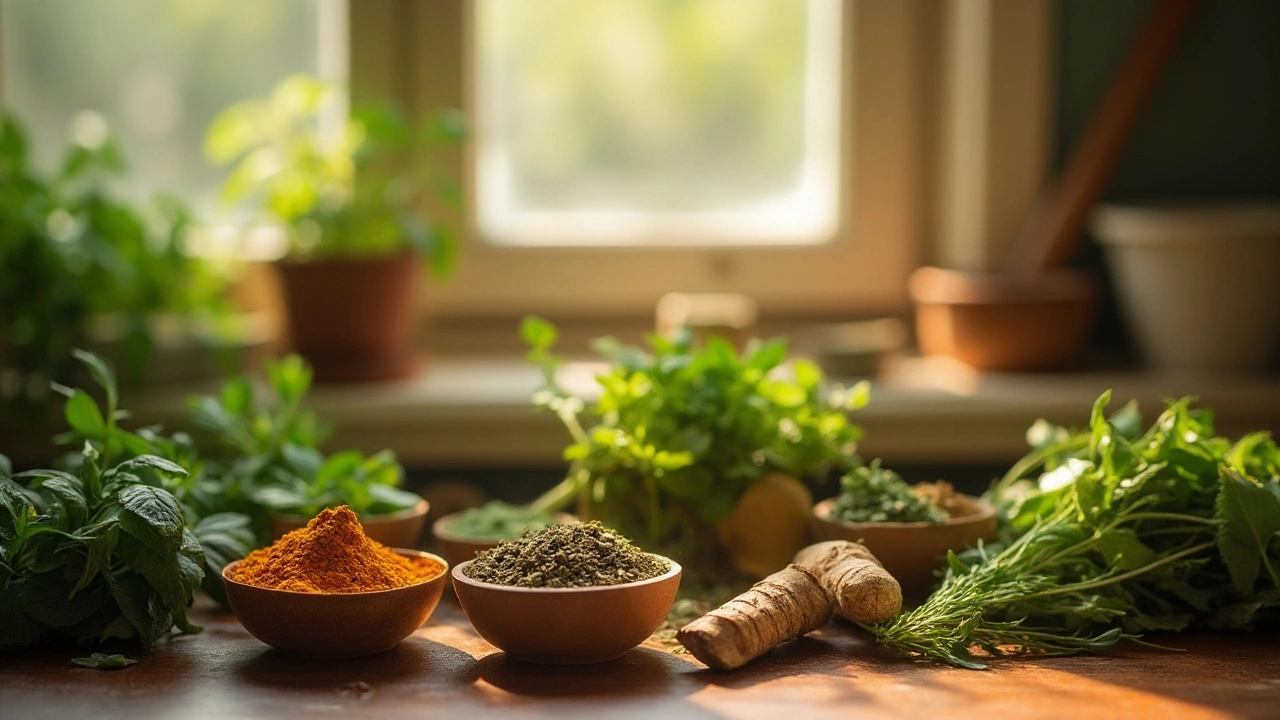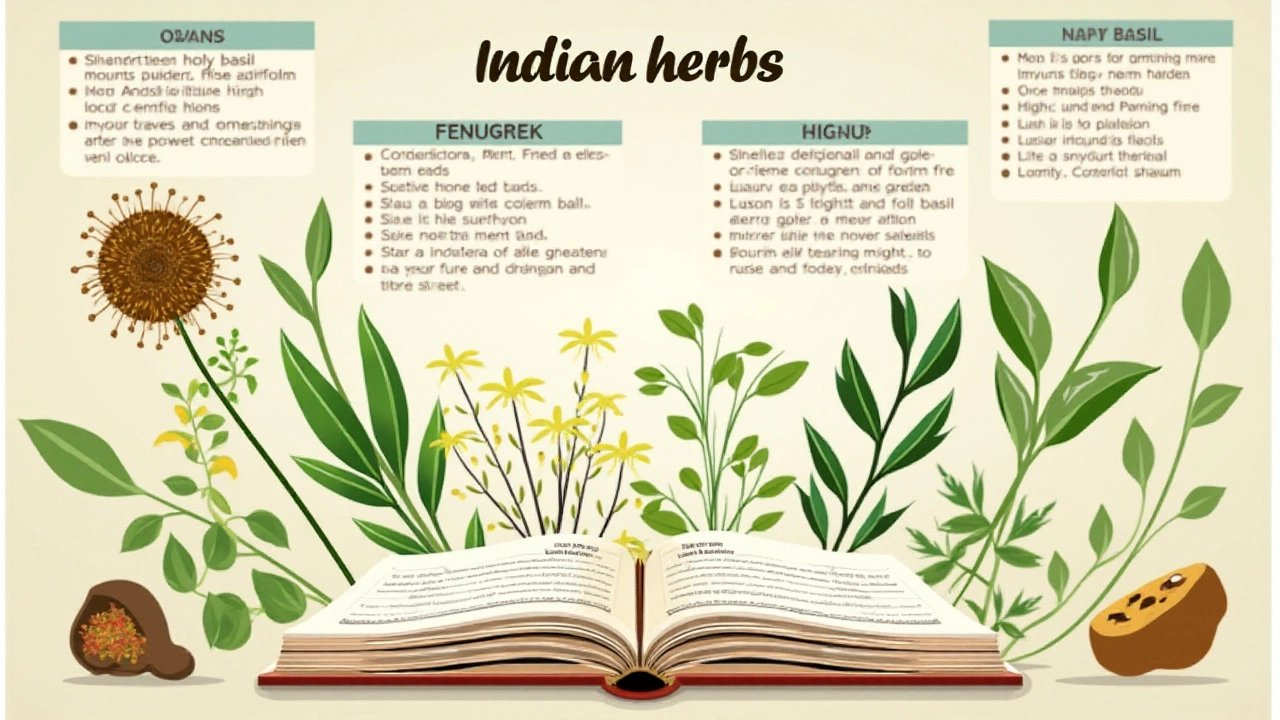
Incorporating herbs into our daily lives is like opening a door to nature's pharmacy, where ancient wisdom meets modern wellness needs. Herbs have silently thrived alongside humanity, offering a plethora of health benefits that many of us are just beginning to rediscover.
Embracing these natural wonders daily can lead to profound health transformations, whether you're seeking more vitality, improved immunity, or simply a holistic approach to well-being. However, with so many herbs to choose from, identifying the best one for daily consumption can sometimes feel daunting.
Through this journey, we'll explore not just the benefits of these powerful plants, but also practical advice on how to seamlessly and safely integrate them into your life. So, let’s delve into the verdant world of herbs and uncover one that might just become your daily companion for better health.
- Introduction to Herbal Wonders
- Key Herbs for Daily Use
- Health Benefits and Real-Life Applications
- Tips for Safe Herbal Consumption
Introduction to Herbal Wonders
Herbs have been the cornerstone of traditional medicine across cultures for millennia, forming a natural bridge between the earth and human health. The healing properties of herbs are mostly attributed to the various compounds they harbor, which work synergistically to benefit the human body. As more people seek holistic and preventive health solutions, herbal supplements are increasingly gaining popularity. These botanical allies offer a wide range of therapeutic effects, from boosting immunity to enhancing emotional well-being.
Historically, herbs have been used as remedies long before the advent of pharmaceutical drugs. Ancient civilizations like the Egyptians, Chinese, and Indians documented herbal preparations, appreciating their vast potential. Today, modern science is beginning to validate many of these age-old usages, revealing how potent these plants truly are. For instance, elderberry is known for its antiviral properties, benefiting those seeking to ward off seasonal illnesses. Certain herbs can complement our diets, providing essential nutrients often missing due to modern agricultural practices.
Interestingly, the World Health Organization estimates that up to 80% of people worldwide use herbal medicine in some form. This reliance emphasizes both the accessibility and effectiveness of herbs for maintaining health. Dr. Andrew Weil, a pioneer in integrative medicine, encapsulates this sentiment:
"Herbs are unique in their ability to provide nourishment and healing at the deepest level of the body's ecology."Appreciating the vast array of natural remedies available can be overwhelming, yet empowering. Understanding the specific properties and uses of each herb can guide us toward making informed decisions in our daily routines.
The resurgence of interest in herbal supplements is fueled by a growing awareness of the side effects associated with some synthetic medications. Herbs often have fewer side effects due to their natural composition yet can still interact with other medications. As such, integrating them into daily life requires knowledge and respect for their power. The ritual of incorporating herbs isn't just about health; it's also about connecting to a centuries-old tradition of healing and wellness that resonates deeply with our innate understanding of nature.
Whether in the form of teas, tinctures, capsules, or even culinary spices, herbs offer versatility in how they're used. Some individuals prefer sipping herbal teas as a soothing daily ritual, while others might opt for tinctures or capsules for convenience. By understanding the diverse array of options, we can align these natural treasures with personal health goals effectively. Making an educated choice starts with appreciating the profound connection between herbs and holistic health, a relationship that promises a future of wellness enriched by nature's bounty.

Key Herbs for Daily Use
Choosing the right herbs for daily use can feel like navigating through a verdant maze; however, some stand out owing to their well-documented benefits and wide usage across various cultures. One of the frontrunners in this botanical race is Turmeric. Known for its vibrant yellow hue, turmeric is lauded not just as a spice but as a robust herbal supplement. This wonder herb contains curcumin, an active compound famous for its anti-inflammatory and antioxidant properties. Many tout turmeric for bolstering joint health, enhancing skin radiance, and even supporting digestive wellness. Including turmeric in your daily routine can be as simple as stirring some into a morning smoothie or enjoying it in a comforting cup of golden milk.
Another cornerstone in the world of herbal supplements is Ashwagandha, an herb deeply rooted in Ayurvedic traditions. This adaptogen is celebrated for its ability to help reduce stress and anxiety, while improving overall energy levels. Ashwagandha can be taken in capsule form or sprinkled as a powder into teas and lattes. A fascinating aspect of this herb is its potential to support brain function, with studies indicating enhanced memory and cognitive abilities among regular users. “Ashwagandha is like a hug from the inside,” states renowned wellness guru, Deepak Chopra, emphasizing its calming effects.
Ginger also demands attention, revered for centuries as both a culinary and medicinal giant. Beyond its zesty flavor, ginger is a reliable ally for soothing an upset stomach and combating nausea. Its potent anti-inflammatory compounds can also be a boon for those dealing with chronic pain or looking to boost their immunity. Incorporating fresh ginger into daily meals or sipping on ginger tea can keep digestive woes at bay, making it a practical choice for daily consumption.
Then comes Ginseng, a staple in traditional Chinese medicine. Its roots are often associated with increased energy and vitality, making it a popular choice for those looking to shake off fatigue without the jitters that coffee might bring. Ginseng can be chewed raw, brewed as a tea, or taken in supplement form. Some studies suggest its role in improving mental sharpness and even supporting erectile health, making it a versatile herb in the realm of herbal supplements.
Adopting these herbs into your daily regimen is just the beginning. As with any supplement, it is crucial to consider the optimal dosage and ensure no adverse interactions if you’re taking prescribed medications. Always consult a healthcare professional, ensuring safe inclusion of these natural helpers in your daily routine. Explore their myriad benefits but proceed with informed caution.

Health Benefits and Real-Life Applications
Integrating herbal supplements into your daily life can feel like embarking on a rewarding journey towards optimal health, armed with nature's timeless gifts. Herbs have maintained their revered status for their extensive health benefits, thanks to their unique compositions of antioxidants, vitamins, and minerals. A daily encounter with such herbs can rejuvenate your body's defenses, foster a deeper sense of well-being, and support a balanced internal environment. Various civilizations have sung praises of these potent plants, each providing not just a physical boost, but influencing psychological harmony as well.
The familiar herbs like turmeric, known for its vibrant yellow hue, have captivated the medical community with their anti-inflammatory wonders. Regular intake of turmeric can contribute to significant pain relief, particularly for those struggling with arthritis. Moreover, herbal heroes like garlic are celebrated for their cardiovascular benefits. Rich in allicin, garlic helps regulate blood pressure and maintain cholesterol levels within a healthy range. Together, these daily herbs exhibit properties that support heart health, nourish skin from the inside out, and even aid in detoxifying the body over time.
Incorporating herbs into meal planning or health rituals can be surprisingly simple. Add fresh herbs to your morning smoothies or infuse them into your teas to savor their revitalizing essence. Dried herbs can be sprinkled onto salads or blended into homemade dressings for a nutritious sprinkle. Exploring new recipes to include these herbs can also help inspire a dynamic, enriched palate, allowing you to experiment with flavors that are delicious and beneficial.
Real-life stories underline the value of these herbs in our daily routines. Many attest to the energizing effects after seamlessly incorporating herbs like ginseng into their regimen—a well-known herb popular for enhancing cognitive function and combatting fatigue. As stated by Dr. Jane Smith of the Herbal Research Institute,
"The integration of herbs such as ginseng in one’s daily intake has shown promising results in improving mental clarity among numerous volunteers, marking a significant stride in natural therapies."Tapping into these herbal treasures can be akin to embracing a holistic approach that addresses the mind, body, and spirit collectively, paving the path for sustainable health practices that resonate with daily lives.
Moreover, if you're tracking data, an insightful perspective may be gleaned from several surveys that highlight the rising trend in herbal supplement use worldwide. Discussing its diverse applications remains at the heart of this wellness revolution. According to a recent study, nearly 70% of respondents reported noticing a tangible improvement in their overall health after adhering to a routine involving herbal supplements.
The accessibility and adaptability of these herbs provide endless opportunities for everyone to embrace wellness naturally. Whether you're crafting a personalized tea blend, indulging in a rejuvenating bath with herbal infusions, or enhancing your meals, herbs offer a flavorful and healthful spice to life. Embracing this natural synergy allows one to feel empowered, drawing lessons from heritage for today's daily health quests.

Tips for Safe Herbal Consumption
Diving into the world of herbal supplements can be both exciting and daunting. With the plethora of herbs available, it's essential to practice safe consumption. Many herbs come with a long history of use, but just because they are natural doesn't mean they are free from risk. Understanding their nature and interaction with our bodies is crucial. One of the foundational steps in ensuring safety is to consult with a healthcare professional, especially if you are currently taking medications or have pre-existing health conditions. This initial guidance can prevent potential adverse interactions that might occur.
Another key aspect is quality. It's important to choose high-quality products from reputable brands. Not all herbal products are created equal, and the market can be rife with low-quality options that might not deliver the desired benefits or, worse, could be contaminated. Look for products that have been tested by third-party organizations. Reading reviews and seeking advice from trusted wellness communities can also be valuable in this decision-making process.
Dosage is another factor to consider. While herbs like ashwagandha or turmeric are lauded for their benefits, exceeding recommended doses in search of quicker results can lead to unintended side effects. Start with the lowest effective dose, monitoring your body's reactions before gradually increasing if necessary. Remember, moderation is key, even with natural remedies. It's a common misconception to equate more with better, which often isn't the case.
Pay attention to the timing of consumption as well. Some herbs are best taken in the morning to harness their energizing properties, while others might be more suited for evenings due to their calming effects. Research or consult with an expert to align your herb intake with your daily routine, maximizing their benefits. It’s an art that enhances your overall experience when integrated correctly.
Here’s an enlightening perspective from the renowned herbalist, Rosemary Gladstar, who once said:
"Herbs work like light switches; they turn us on. Each herb comes with its particular gift, a special attribute that awakens the light within us."This quote serves as a gentle reminder of the power that herbs can have, provided they are approached with respect and knowledge.
Lastly, keep a personal journal to document your experiences. Note any changes in your body or mood, and adjust your intake accordingly. This practice not only helps in understanding your unique response to these natural remedies but also provides a reference point for future use. Engaging actively with the process can lead to a more enriching experience, revealing insights tailored to your personal health journey.

Write a comment